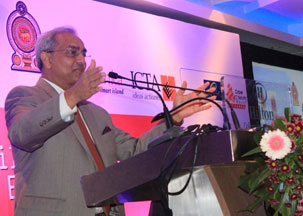|
Electronic evidence and cyber crime issues:
Thinking out of the box vital - CJ
The fight against cybercrimes and presentation of electronic evidence
calls for thinking out of the box, said Chief Justice Mohan Peiris at
the Capacity Building Workshop on cyber crime for law-enforcement
officers, prosecutors and judges, in Colombo recently.
 |
|
Chief Justice Mohan Peiris delivers
the keynote address at the workshop. |
The event was hosted by the Council of Europe and the Information and
Communication Technology Agency of Sri Lanka (ICTA).
The workshop also coincided with was a part of the Cyber Security
Week (CSW) hosted by ICTA with the Sri Lanka Computer Emergency
Readiness Team Coordination Centre (SLCERT-CC), a subsidiary of ICTA.
"Two publications produced by Council of Europe, the 'Electronic
Evidence Guide' and 'Judicial Training Manual', are not only fascinating
literary pieces but also valuable academic works," he said.
"All legal proceedings rely on the presentation of evidence in the
course of legal proceedings. This is a simple thing. But evidence that
originates from electronic devices such as computer networks, mobile
telephones, digital cameras, data storage devices and the internet are
forms of electronic evidence. Evidence which is electronic in nature, is
not so different from the usual evidence that is led in legal
proceedings," the Chief Justice said.
"Do not to treat this as something that has sprung up from nowhere.
Let us see what kind of accommodation we can give to this new phenomenon
as buttressed by new legislation. That's the harmony that we have to
strike," he said.
The CJ paid tribute to ICTA for its contribution towards IT related
legislation, particularly, the Electronic Transactions Act No. 19 of
2006 and the Computer Crimes Act No. 24 of 2007. While the Electronic
Transactions Act provides the framework legalising e-commerce,
e-business and e-governance with a unique evidence regime for the
admissibility of electronic documents in courts, the Computer Crimes Act
provides safeguards against cybercrime.
This legislation and consequential policy changes make Sri Lanka
e-ready to march towards e-governance.
"Given the ubiquitous nature of the internet to swiftly and
effectively transcend national borders and sovereign territories, we
live and transact business in a borderless world today," he said.
"It was axiomatic that criminal activity using computers had come to
stay. As such this was an area where global co-operation and mutual
assistance must be fostered and promoted," the Chief Justice said.
He said a powerful tool in English Courts, which has now come to be
known as Norwich Pharmacal orders, by which Facebook was compelled to
lift the veil of anonymity and disclose the registration information
used for creating false profiles.
The Norwich Pharmacal orders have become powerful weapons even in the
case of money laundering offences, which too are committed using the
internet. Despite the secrecy obligation of a banker towards his
customer, the bank can be compelled by this order to disclose the
identity of a money laundering customer, the Chief Justice said.
"In the Sri Lankan context, under Section 18 of the Computer Crimes
Act No. 24 of 2007, by which an expert or a police officer investigating
cybercrimes in Sri Lanka can compel a service provider to reveal
subscriber information and traffic data by virtue of a warrant obtained
from a magistrate. This provision is consistent with Article 16 of the
Budapest Convention of Cybercrime," he said.
The Convention provides new detection procedures for fraud and child
pornography and gives greater powers to law enforcement agencies to
patrol the internet. This is partly enabled by the involvement of
internet service providers (ISPs), upon whom some burdensome data
preservation requirements are applied, the Chief Justice said.
Law enforcement agencies could place 90-day preservation orders on
ISPs to retain data for inspection during criminal proceedings.
Confidentiality clauses will prevent the ISP from disclosing the
existence of a preservation order as it might impede a criminal
investigation.
The Budapest Convention on Cybercrime exhorts countries to harmonise
national legislation and facilitate investigations and co-operation
between law enforcement operations globally.
The Chief Justice said, "Harmonisation of cybercrime law, just like
harmonisation of business law, was indispensable in eliminating computer
crimes."
Article 19 of the Convention provides for international co-operation
by including criminal offences covered by the convention shall be deemed
to be included as extraditable offences in any extradition treaty
between the parties. The Sri Lankan Computer Crimes Act mirrors this
Article in Section 27 which sets out computer crimes as extraditable
offences, he said.
Article 22 of the Convention states that parties shall provide mutual
assistance to one another in the investigations or proceedings
concerning criminal offences.
Section 35 of the Sri Lankan Act unequivocally declares that the
Mutual Assistance in Criminal Matters Act No. 25 of 2002 shall be
activated wherever it is necessary for the investigation and prosecution
of an offence, when providing mutual legal assistance. These are a
handful of provisions among many of the salient Articles of the
Convention vis-a-vis the Sri Lankan Act, the Chief Justice said.
The Sri Lankan legislation fully complies with the letter and spirit
of the Budapest Cybercrime Convention, he said.
|

